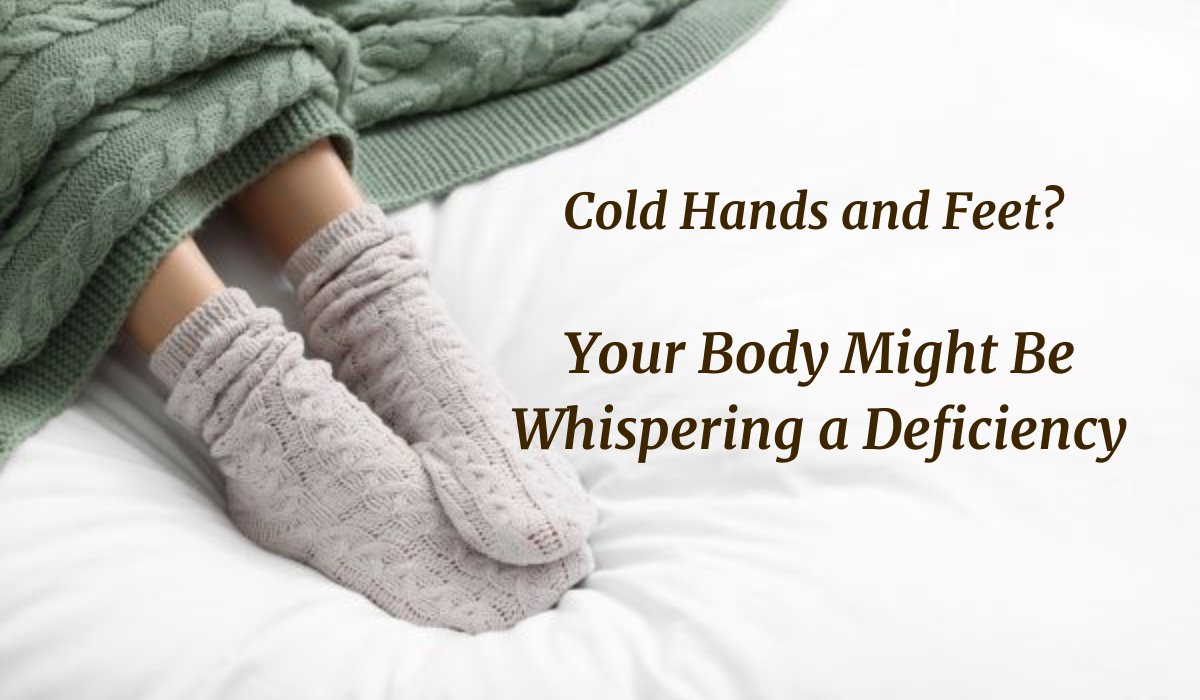You pull on socks when no one else is cold.
You’re the one with fingers like icicles, even in moderate weather.
Everyone blames the AC, poor circulation, “low BP,” or just “that’s how I am.”
But what if this chilly feeling in your extremities wasn’t just your personality…
But a subtle alarm from your thyroid or iron levels?
Let’s decode it.
Cold Hands and Feet Are Not Just a Winter Problem
If your hands and feet stay cold:
-
Even when the room feels warm
-
Even after movement
-
Even when your blood pressure is fine
It could point to something deeper – something cellular.
And two of the most common (and overlooked) culprits?
Low thyroid function and iron deficiency.
Let’s Talk Thyroid First — The Body’s Thermostat
Your thyroid hormones (T3, T4) play a key role in regulating your metabolism — which includes how well your body generates heat.
When thyroid function is low (even subtly), your cells slow down.
This leads to:
-
Sluggish blood flow to extremities
-
Less internal heat production
-
Reduced oxygen delivery to hands/feet
The result? You feel cold, tired, and foggy — but your tests may still say “normal.”
Especially if your TSH is borderline high (above 2.5) or T3 is on the lower end, your cold limbs could be an early sign.
Now Add Low Iron to the Mix – The Oxygen Transporter
Iron is essential for hemoglobin, which carries oxygen in your blood.
Low iron = poor oxygen = poor heat circulation.
You may not even be anemic on paper. But if:
-
Your serum ferritin is <40
-
You have low B12
-
You feel tired, pale, restless, or dizzy
-
Your nails chip and your hair sheds easily
…then your body may be struggling to warm itself from the inside out.
Tip: Cold hands + hair loss + sugar cravings = investigate iron + thyroid together.
But Wait — Why Are You Cold and Bloated at the Same Time?
This is the part no one tells you:
Low thyroid and low iron often co-exist. Why?
-
Low thyroid reduces stomach acid → poor iron absorption
-
Iron is needed to convert T4 to T3 → poor thyroid activation
-
Gut inflammation (gas, bloating) reduces both
So your cold feet might not be just a “circulation” issue — it could be a feedback loop between your gut, hormones, and minerals.
How to Support Your Body Holistically (Not Just Warm Socks)
Here’s what actually helps — not just managing symptoms, but improving function.
1. Get the Right Tests
Ask for:
-
TSH, Free T3, Free T4
-
Anti-TPO (if suspecting autoimmune thyroid)
-
Serum Ferritin, Iron, TIBC
-
Vitamin B12, Vitamin D3
Don’t just rely on “normal ranges.” Functional levels matter more than lab borders.
2. Improve Your Iron Absorption
-
Start your day with vitamin C-rich water (amla, lemon, orange)
-
Cook in iron utensils (especially for acidic foods)
-
Avoid tea/coffee with meals — they block iron
-
Include soaked raisins, dates, garden cress seeds (halim), sesame, and jaggery wisely
3. Support Thyroid Function
-
Ensure enough iodine, selenium, and zinc — all crucial for T4 to T3 conversion
-
Avoid excess raw cruciferous veggies if already low
-
Address gut inflammation with buttermilk, jeera water, fermented foods
4. Lifestyle = Medicine
-
Don’t skip breakfast — your thyroid needs morning fuel
-
Move your body — even 15 min of sun + walk can boost circulation
-
Prioritize sleep — both thyroid and iron metabolism rely on it
-
Track your cycle — if you bleed heavily, iron drops faster than you think
Bottom Line:
If your hands and feet are always cold, your body isn’t being “dramatic.”
It’s trying to conserve energy — and that’s a sign.
Listen before it speaks louder through fatigue, weight gain, hair fall, or mood shifts.
You don’t need more caffeine or warmer socks.
You need to ask your body what it’s missing — and give it the tools to warm up from within.



